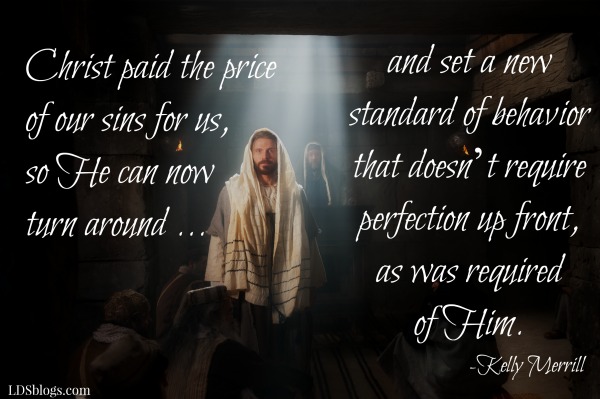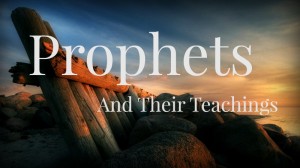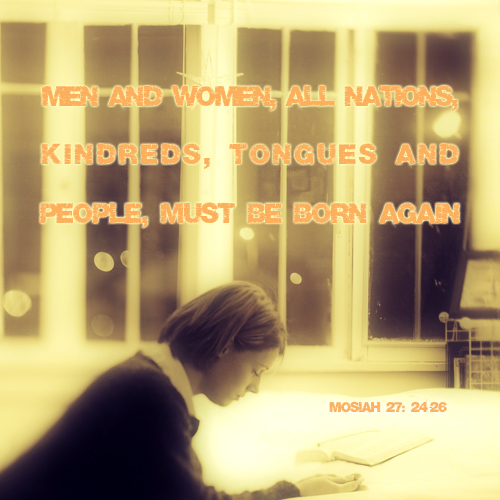In this second part of the series on grace, the questions about grace continue. In the first part, we discussed what grace is and where it comes from. The last set of questions will be in next week’s installment, and the last question on how we can receive grace according to the Latter-day Saint definitions of grace, justification, and sanctification will be discussed.
Aren’t we automatically saved through the Atonement of Christ?
The third article of faith states:
We believe that through the Atonement of Christ, all mankind may be saved, by obedience to the laws and ordinances of the Gospel.
 Note the use of the word “may” and the lack of the word “will.” So the short answer is no, we are not automatically saved through the Savior’s Atonement. The Atonement did pay for the sins of all mankind, settling our debts with the Father. But now we owe the Savior for our misdeeds, instead of the Father. The Savior cannot forgive a debt to the law just because He would like to any more than our Father could forgive the debt to broken laws.
Note the use of the word “may” and the lack of the word “will.” So the short answer is no, we are not automatically saved through the Savior’s Atonement. The Atonement did pay for the sins of all mankind, settling our debts with the Father. But now we owe the Savior for our misdeeds, instead of the Father. The Savior cannot forgive a debt to the law just because He would like to any more than our Father could forgive the debt to broken laws.
Christ paid the price of our sins for us, so He can now turn around and set a new standard of behavior that doesn’t require perfection up front, as was required of Him. We cannot pay for our own sins because we are not perfect. Christ was perfect, so He could pay the price for our sins. The mercy He can offer us, because of His payment for us, allows us the time we need in mortality to practice obedience. His mercy, His grace, offers us the opportunity to repent and become better, with His help and the guidance of the Holy Ghost.
He uses his sacrifice to help us become holy as He is holy. The Atonement satisfied a family debt, but also opened up limitless possibilities for our advancement and ultimate exaltation. But Christ’s payment of the debt did not, in and of itself, guarantee us anything but a resurrection and a promise of judgment for our choices. I will add to that list the ability for us to exercise our agency. Without the Atonement, we could not choose to repent and change. These outcomes from the Atonement are gifts of love from Christ and our Father in Heaven.
Did the Atonement do anything for us besides pay our debts?
 Yes, it most definitely did! Because of the payment Christ made in our behalf, He can now offer us a period of testing and time to prove ourselves that we did not have before. Without the Atonement, we stood condemned before God and it was an unreconcilable condemnation. With the payment made, we can now live the commandments and learn day by day how to be more Christlike. We have time to practice becoming perfect like Christ.
Yes, it most definitely did! Because of the payment Christ made in our behalf, He can now offer us a period of testing and time to prove ourselves that we did not have before. Without the Atonement, we stood condemned before God and it was an unreconcilable condemnation. With the payment made, we can now live the commandments and learn day by day how to be more Christlike. We have time to practice becoming perfect like Christ.
It is important to remember that the definition of being perfect in the scriptures has nothing to do with never making mistakes. No human can be that good. To be perfect in the scriptural sense means to be whole or complete. When Christ tells us we need to become perfect as He and His Father are perfect, He is saying that we need to become experts at repenting. Repentance teaches us how to take our deficits and become whole or complete. That is perfect in scriptural language.
In a June 2001 article in the Ensign Magazine, Elder D. Todd Christofferson addressed the issues of justification, sanctification, and grace. He says that in order to be justified, or cleared by eternal law, so that you are not in any danger of punishment, constant repentance is required.
To be classed among the truly penitent, random acts of obedience will not be adequate. We must properly enter into the covenants and persist in keeping them to the point that our expectation of salvation is affirmed by the Holy Spirit of Promise (see D&C 132:7,19). It is not simply the promise of obedience in our contracts with Deity that brings grace, but the performance of our promises: “For not the hearers of the law are just before God, but the doers of the law shall be justified” (Rom. 2:13).
Is there a difference between grace and the gift of grace?
 For some people, the difference between grace itself and the gift of grace will appear to be nothing more than someone just playing with the language. Grace is an undeserved kindness that is given out of love. In terms of how we most often use the term, grace is also the enabling power and healing power God gives to us to help us make the changes necessary to return home triumphant.
For some people, the difference between grace itself and the gift of grace will appear to be nothing more than someone just playing with the language. Grace is an undeserved kindness that is given out of love. In terms of how we most often use the term, grace is also the enabling power and healing power God gives to us to help us make the changes necessary to return home triumphant.
The gift of grace includes all the parts of the plan of salvation that make the use of grace possible in our lives. The gift of grace includes the atoning sacrifice that makes a resurrection and judgment possible. The Atonement also makes it possible to use the real power of our agency in becoming godly in our lives. The gift of grace also includes the gift of the Holy Ghost, our tutor and instructor, our guide back to the Father. The gift of grace in our lives includes all the ways in which Christ enables us to change for the better, to be more obedient, to find joy in our service, to know how to serve better, and how to become more Christlike in our feelings towards others. And, of course, the gift of His grace includes all the covenants we are permitted to make that enable us to change and become more like Him.
How does grace fit with becoming justified and sanctified?
Let’s look at Moses 6:59 – 60:
By reason of transgression cometh the fall, which fall bringeth death, and inasmuch as ye were born into the world by water, and blood, and the spirit, which I have made, and so became of dust a living soul, even so ye must be born again into the kingdom of heaven, of water, and of the Spirit, and be cleansed by blood, even the blood of mine Only Begotten; that ye might be sanctified from all sin, and enjoy the words of eternal life in this world, and eternal life in the world to come, even immortal glory;
For by the water ye keep the commandment; by the Spirit ye are justified, and by the blood ye are sanctified.
Let me just say at the beginning of this explanation that none of this subject is possible without the grace that gave us the Atonement. The Atonement makes all of this possible.
Just as each of us are born into the world by water (amniotic fluid), blood (yes, there is blood involved in birth), and the spirit (the spirit enters the physical body, which is what animates the body and makes it “alive”), so we must have the same three components present to be born into the spiritual realm.
The water is represented by the waters of baptism. It is through baptism that we demonstrate our willingness to follow all of God’s commandments. The waters of baptism symbolically represent all of the commandments in which we promise to immerse ourselves, with the promise from God that if we do we will rise from those “waters” as new people, cleansed from our old life, to live as trusted servants of God.
The spirit that animates our bodies represents the Holy Spirit that will animate us with the knowledge of God. He will teach of God’s ways, and help us become in tune with eternal law so we are free to act and move within the laws of happiness that make up the gospel of Christ. To be justified means to live in harmony with God’s laws. Happiness can only come to those who live in harmony with the laws that create happiness, and all of God’s laws lead to happiness. No one can walk back into the presence of the Father and be acceptable, unless they are completely justified or in other words, living in complete harmony with all of God’s commandments.
The sacrifice Christ made for us in His Atonement does more for us than just pay for sin. His grace also enables us to become holy, pure, without spot, blemish, or stain upon our soul. His forgiving power has the ability to not only wipe away the sin, but also reverse the effects of that sin. Whereas sin spots and corrupts our soul, so Christ’s forgiveness, through the blood He shed in our behalf in the Atonement, has the ability to scrub clean the stains of disobedience, leaving our garments white, and without reproach. In other words, our garment (our soul) is purified, and freed from all the effects of sin that corrupt our thinking and our feelings. We become pure as Christ is: pure and clean, through and through, as He is clean. This is what is meant by being washing clean in the blood of the Lamb. It is His grace that makes this cleansing possible.
Conclusion
In the next installment, we will continue with the last three questions about grace, including the all-important one: How do I receive the gift of grace? The last question will tie everything from the previous questions together.
About Kelly P. Merrill
Kelly Merrill is semi retired and writes for https://gospelstudy.us. He lives with his wife in Idaho. His strength is being able to take difficult to understand subjects and break them down into understandable parts. He delights in writing about the gospel of Christ. Writing about the gospel is his personal missionary work to the members of the Church and to those of other faiths who are wanting to know more about Christ's gospel and His Church.







